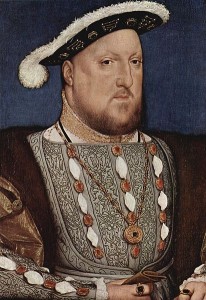 There is an amazing linkage between Henry VIII (king of England from 1509 to 1547) and the founding of Boston. In his quest to produce a male heir, Henry wanted to divorce his first queen, Catherine of Aragon. The pope refused to annul the marriage, so Henry drove what became known as the English Reformation (+/-1530) by which the Church of England broke away from the authority of the Pope and the Roman Catholic Church. (Henry’s motives were also political, but that is another story.)
There is an amazing linkage between Henry VIII (king of England from 1509 to 1547) and the founding of Boston. In his quest to produce a male heir, Henry wanted to divorce his first queen, Catherine of Aragon. The pope refused to annul the marriage, so Henry drove what became known as the English Reformation (+/-1530) by which the Church of England broke away from the authority of the Pope and the Roman Catholic Church. (Henry’s motives were also political, but that is another story.)
When England broke with the Catholic Church, many different Protestant sects vied for power. After Henry’s death, his daughter, Queen Elizabeth I (the Virgin Queen, reigning 1558-1603), set out to eliminate the “foolish theological quibbling” among the Protestant sects by formalizing the Church of England (Anglican Church) as the official church and instituting Penal Laws to enforce compliance.
The Church of England retained many of the trappings and hierarchy of the Catholic Church, which many English Protestants abhorred. Some dissenters joined the Church of England and worked to “purify” the church from within, becoming known as “Puritans”. Some refused to join church, and became known as “Separatists.”
Elizabeth’s successors, James I (rule 1603 – 1625) and his son Charles I (rule 1625 – 1649), made things particularly uncomfortable for the dissenters and were zealous in enforcing conformity to the Church of England. The persecution inflicted on the non-conforming Protestant approaches prodded two key groups to leave England in search of religious freedom and found settlements important to Boston history.
The first group of dissenters were Separatists, who after departing England for Holland in 1608, left for America 1620 and founded Plymouth, about 40 miles south of Boston. This group was relatively poor and agrarian.
The second group was more affluent and included sophisticated merchants and businessmen. Led by John Winthrop, they sailed from England to New England in 1630 with the ambitious mission to create a new society, a “city upon a hill” (reference from Jesus’ Sermon on the Mount), that would be watched by the world. This new kind of society would balance both civil and ecclesiastical dimensions for the good of the public – guided by God and the Bible. This group landed near present day Salem, MA, about 20 miles north of Boston. They then moved south and founded Boston, named for a town near their home in Lincolnshire, England.
Would Boston have been founded if Henry had not wanted a male heir? Over time, there would have certainly been an important city at site of present-day Boston. However, it would not have been called Boston, and it would not be close to the city we know. The Puritans, their culture, their society and even their form of governing was instrumental to the character of early Boston, the American Revolution, and lives on to this day. Thank you, King Henry.
Henry VIII’s Critical Influence on Boston’s Founding
November 4, 2011 by























[…] described in my entry on Henry VIII’s influence on the founding of Boston, life in the 1620’s England was becoming very difficult for English Puritans. This was […]